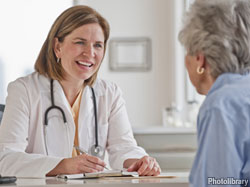
(ARA) – For many women, the role of “mom” and “caregiver” are one and the same. Whether it’s for her children, spouse or her own parents, mom is there. However, when heart disease strikes in women – often in the form of a heart attack or stroke – the roles often are reversed and mom is transformed from “caregiver” to “care receiver.”
Carol Morrissey, 69, learned this first hand when she had a heart attack at age 53, requiring quadruple heart bypass surgery. During her recovery, Carol’s daughter Karen took time off from work and traveled to care for her mom.
“It was pretty overwhelming,” says Karen Morrissey . “My mom is usually the first person I go to for help, and now she was the one who needed me most.”
While a heart attack may come as a surprise to many women and their families, the prevalence of heart disease in women can be just as shocking.
“Heart disease is the leading cause of death for American women, accounting for more than a third of deaths each year,” says Lisa M. Tate, chief executive officer of WomenHeart: The National Coalition for Women with Heart Disease, the nation’s only patient advocacy organization supporting the 42 million American women living with or at risk for heart disease. “Unfortunately women are less likely than men to receive appropriate treatment after a heart attack.”
As in Carol and Karen’s case, heart events can impact the entire family beyond just the women themselves. As the baby-boomer generation ages, more spouses and adult children will be called upon to care for the health of family members. Surveys indicate that younger generations are increasingly feeling the pressures of caring for older loved ones, and older generations are aware that their health decisions can affect the health of those around them.
“The life changes that occur after someone has a heart attack – changes in diet and exercise, new medication regimens, the depression that heart attack survivors sometimes feel – can be overwhelming for the family,” says Tate. “Family members, however, are an important part of the team, helping their loved one recover from a heart event and avoid a second one.”
Family members can help their mother recover from a heart attack – and hopefully avoid a second one – in several ways:
* Remind mom about the importance of adhering to the medication regimen set by her doctors. Even simple steps like a regular aspirin regimen can prevent another heart attack by 30 percent, but it is important to make a plan together with mom’s health care team.
* Look for ways to help mom reduce stress, perhaps through practicing meditation, yoga or rhythmic breathing.
* Provide encouragement for improving her diet and exercise habits, quitting smoking and adhering to the doctor’s orders for rest and medication, without nagging or becoming discouraging.
* Balance time for visits from friends and loved ones so she can still get the rest she needs.
* Most importantly, take care of yourself and if you become overwhelmed, seek professional counseling or support from others in similar situations via online and in-person support groups.
“My daughter has been just as much a part of my recovery process as my doctors and medicines,” says Carol. “Karen made some great heart healthy meals and was right at my side for daily walks. She reminded me to take my aspirin and other medicines every day, came with me for check-ups and helped me stay on my diet and exercise routine. I was most grateful for the emotional support and the time to bond. She really helped me overcome a big hurdle in my life.”
Visit www.iamproheart.com to learn more about healthy lifestyle choices that can help prevent a heart attack, and to find out more about aspirin, which can reduce the risk of death by up to 23 percent if administered when a heart attack is suspected and for 30 days thereafter. For more information and tips for recovering from a heart event, visit www.womenheart.org.
Aspirin is not appropriate for everyone, so be sure to talk to your doctor before you begin an aspirin regimen.
Courtesy of ARAcontent





